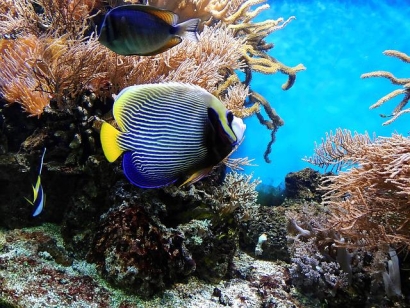
Thanks to these benefits, aquariums have been great for helping people living with hyperactivity or Alzheimer's.
Keeping fish is also a great way to introduce your children to the fun and responsibility of a pet, and can allow them to express their creativity by designing the tank.
The downside to having a home aquarium is that they aren’t always energy efficient. Fish need lighting, heat, and filters to live a good life, and adding plants to your tank can complicate matters further. The good news is that there are ways to make your aquarium more energy efficient.
Lighting is the aquarium element that consumes most of an aquarium’s energy, adding up to half of the aquarium’s upkeep costs. Older aquarium lights have utilized fluorescent bulbs, which are not energy efficient.
Having lights in your aquarium not only gives you the ability to fully see the environment you’ve created, but it is also vital for your fishes’ day and night cycles. There are ways to save energy while providing your fish with an easy-to-see home. You’ll need to consider the type of fish you have and any plants in the tank to determine the amount of light your aquarium needs.
One energy-saving option is swapping out fluorescent lights with light-emitting diode (LED) lights. These use up to 90% less energy than fluorescents and last longer. These bulbs also distribute heat evenly, while fluorescents emit all their heat from the top of the bulb. Thanks to this, LEDs do not overheat or create uneven heat within your tank.
Another simple option is to place your tank under a lamp or by a window. Having natural or ambient light will help save you the need for specialized aquarium lights.
Utilizing the sun’s light will also help to keep your fish on a more natural day and night cycle by eliminating the need to mimic the cycle with artificial lights.
Having natural plants can bump up your lighting needs since they typically need around 12 hours of light. Consider having fake plants or researching a good combination for your fish.
Your aquarium heater needs will depend on the size and location of your tank.
A 30-gallon tank will use between 150 and 200 kWh of energy per year for heat but will use more heat the colder the environment is. Tank heaters run on an internal thermostat, which will heat the water to your needed temperature when it detects the temperature drop too low, similar to a heating, ventilation, and air conditioning (HVAC) system found in homes.
If you place your tank in a room that stays warmer, you will be using less energy from the heater than if you place it in a room that stays cool. You can also use an insulation material, like polystyrene, at the bottom of the tank to conserve heat.
Another energy-saving option for heating your aquarium is using a solar heater with an aerator stone to send cold water up to the heater to be warmed and sent throughout the tank. A low-output solar heater will last longer than an average high-output heater without using electricity.
One of the first things when deciding to have an aquarium is determining the type of water the tank will need to keep your fish happy and healthy. The next thing should be determining the correct pumps necessary to keep that water clean and oxygenated.
For a freshwater tank, you’ll need air pumps, powerheads, water filters, and ultraviolet light (UV) filters. While these items will use energy, the amount required is determined by the equipment you choose to purchase.
UV filters can eat up to 130 watts of energy if you’re not careful, and the quality of your pumps can make a huge difference in efficiency.
A pump may seem like a steal at a low price, but be wary of rusted screws and cracked wires developing that can be dangerous and lead to you spending more money. The cracked casing of a pump that has copper wiring can even lead to humans being shocked. Do research to find a pump that will hold up but fit your budget.
Improving the energy efficiency of your aquarium helps the environment and saves you money. It is a bonus of an already satisfying hobby.
However, you don’t want that hobby to come with the side effect of harming the environment and your wallet. Working to create an energy-efficient aquarium can help you enjoy your fish to the fullest and make the most of your aquarium.

